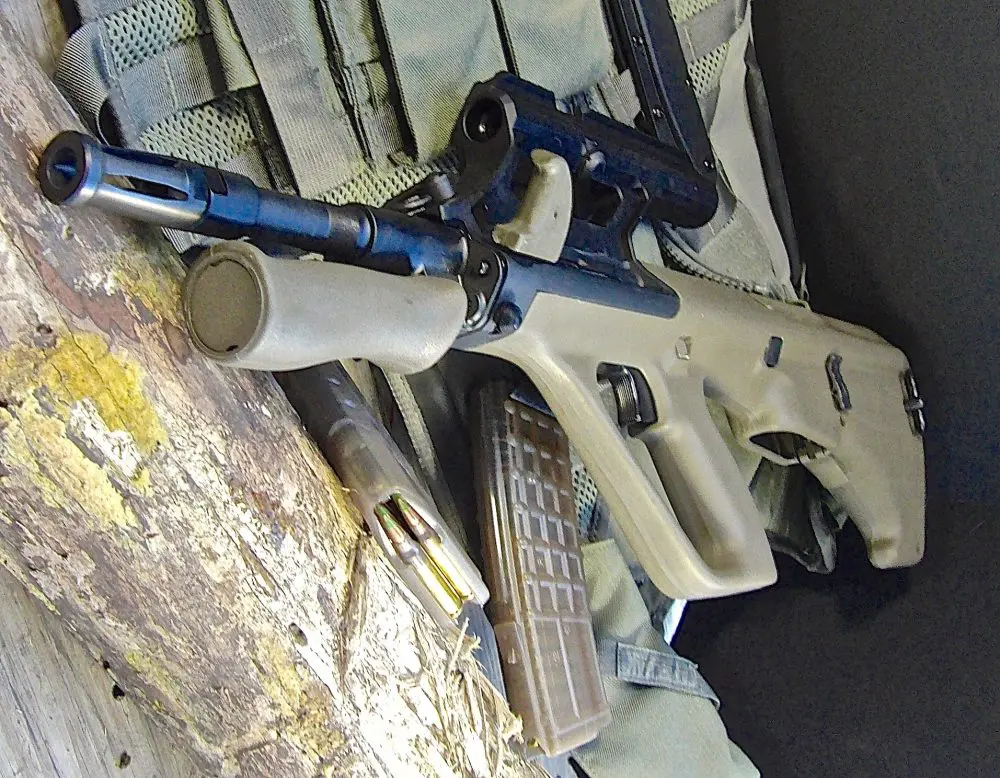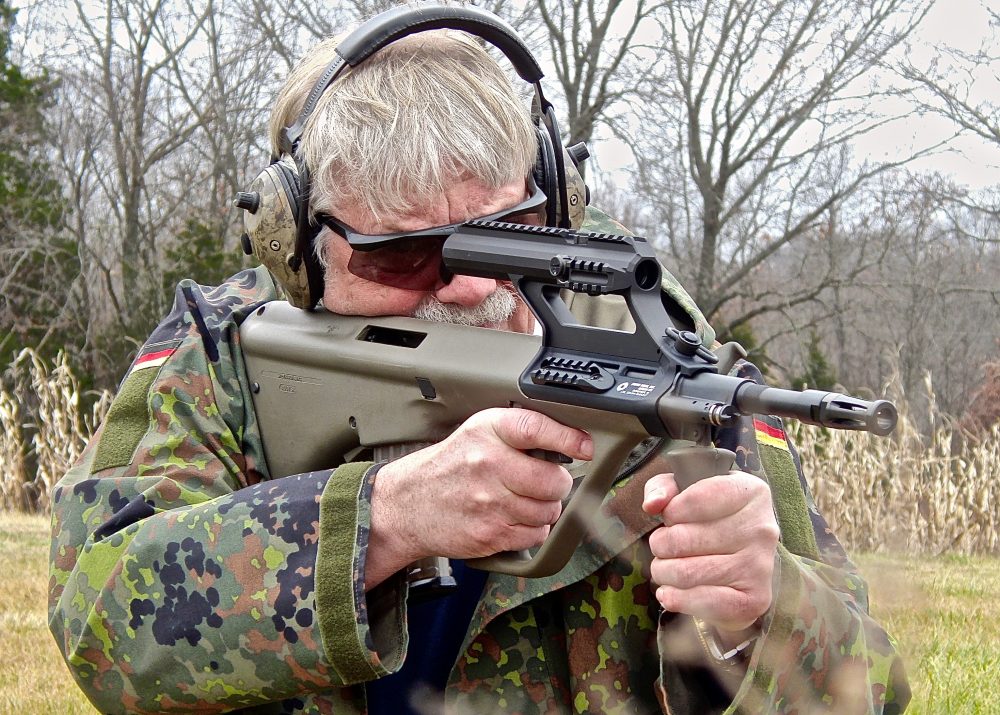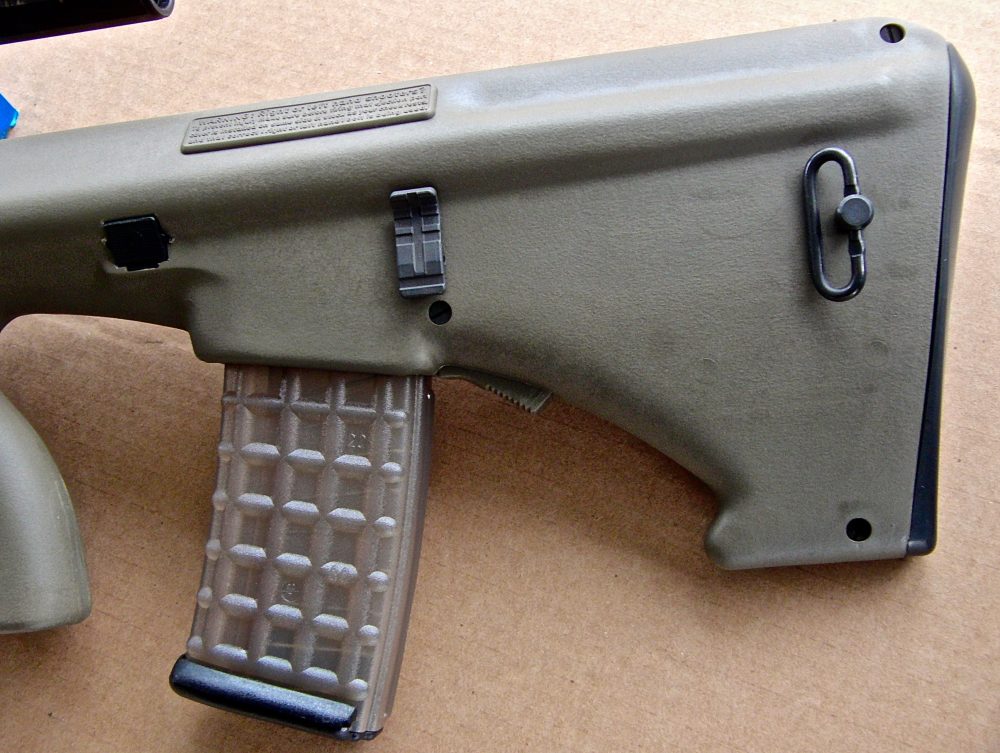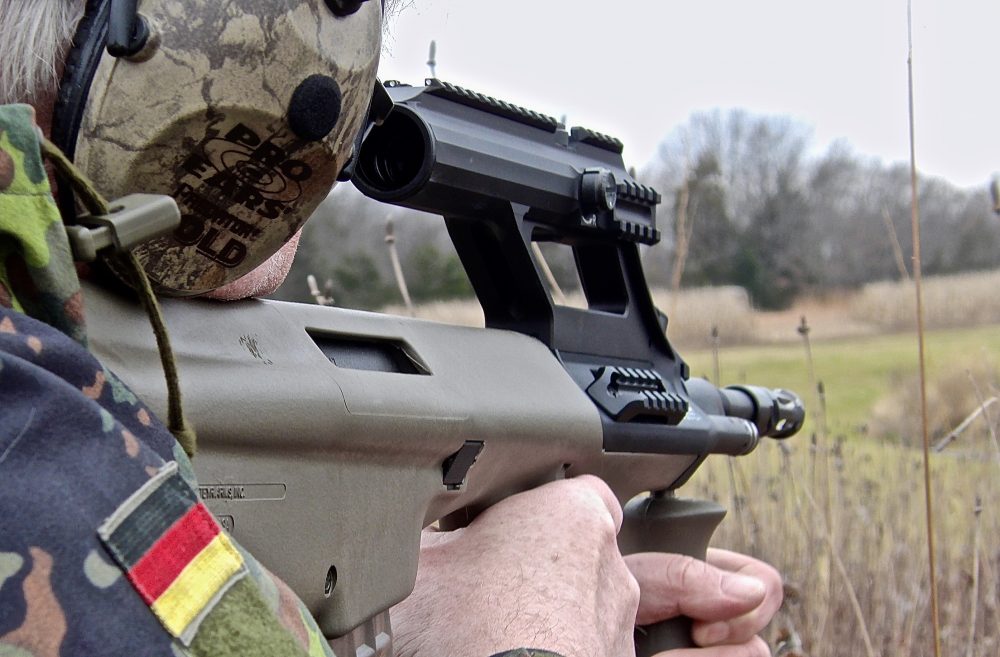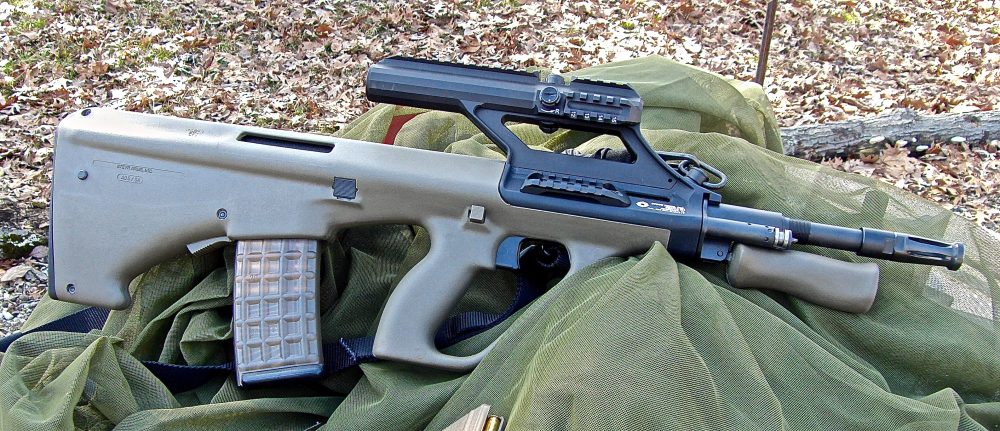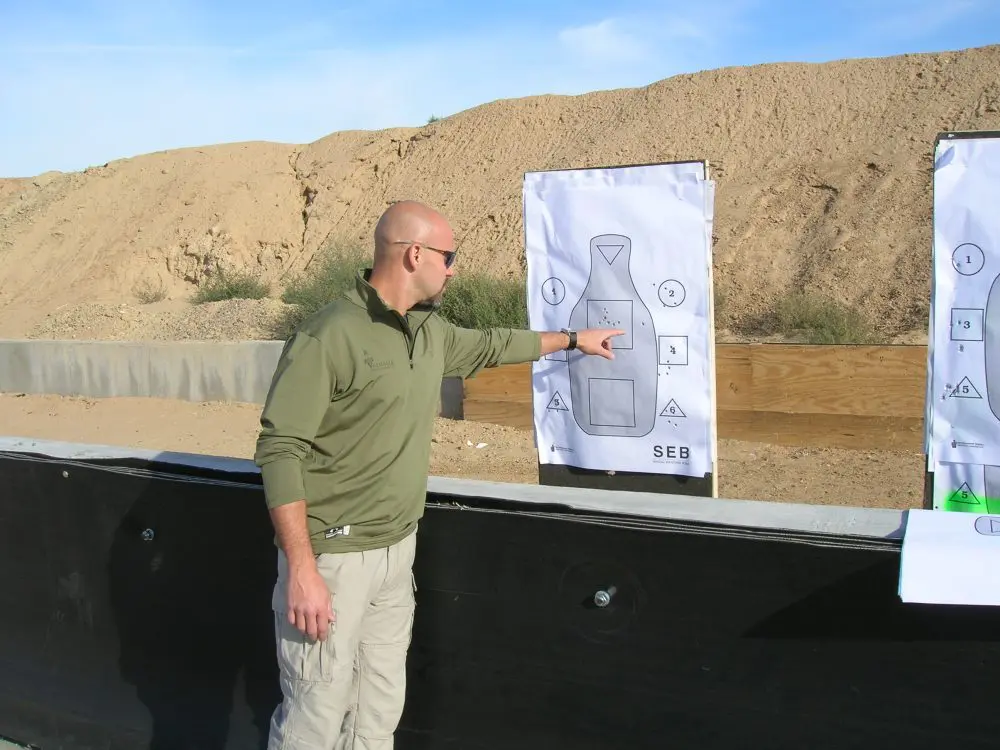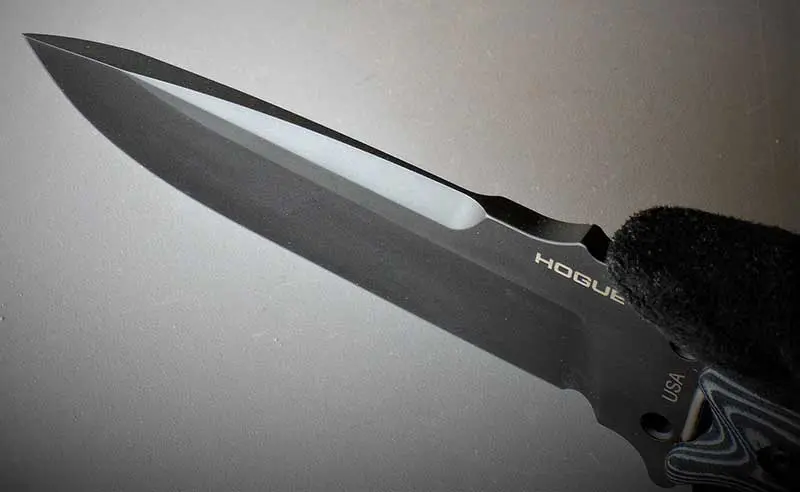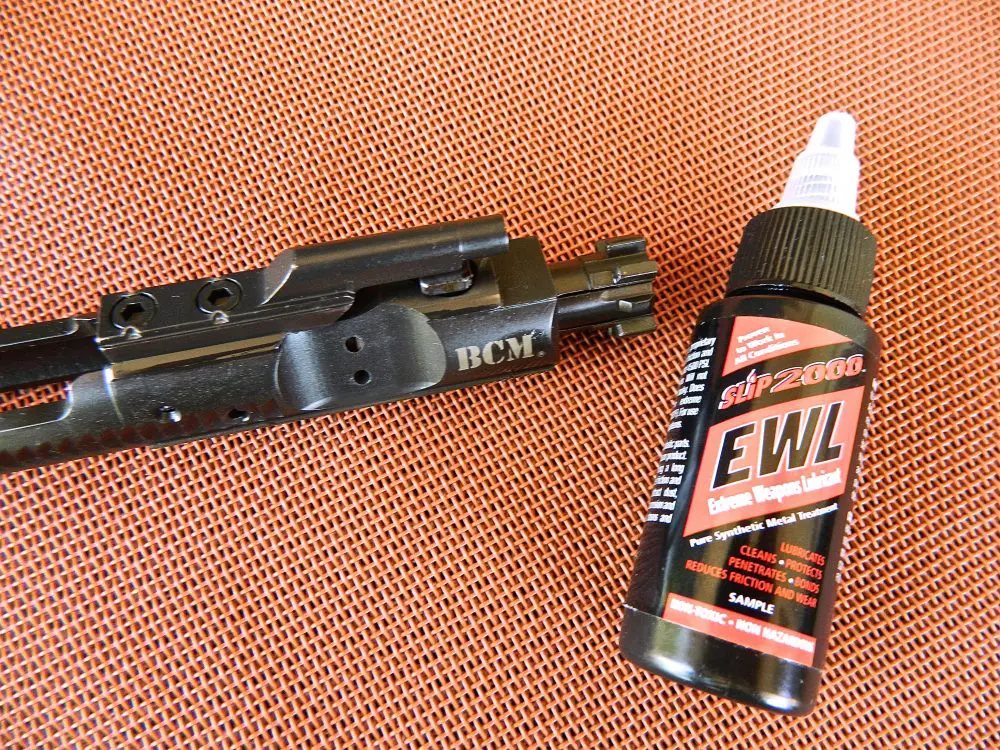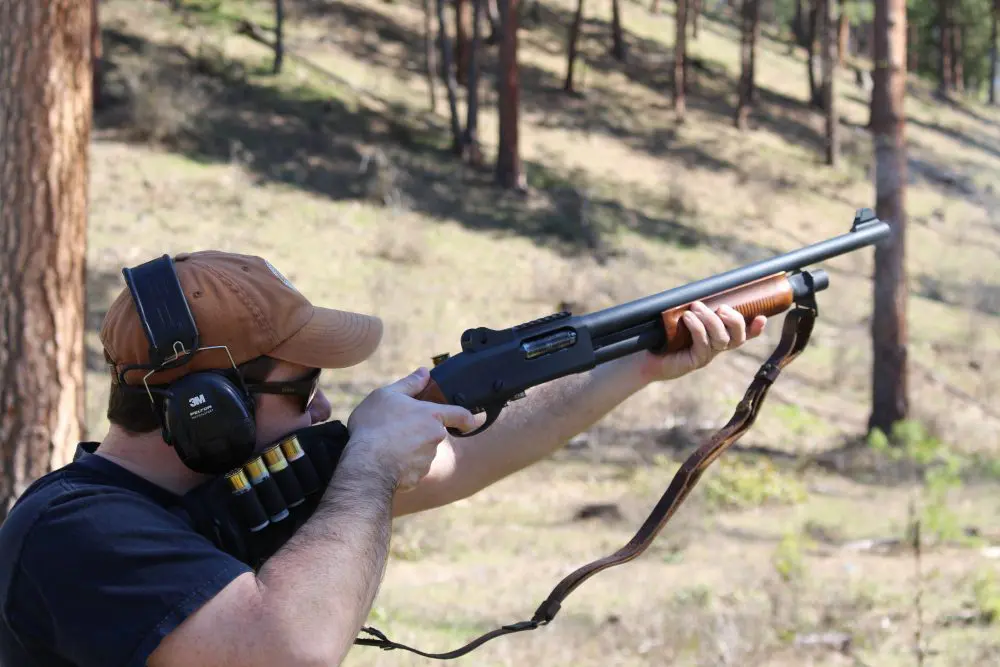I’ve liked the Steyr AUG ever since I first fired one about 35 years ago. It made me a believer in bullpup designs because I find it comfortable to shoot, easy to store in a vehicle, and fast-handling.
The AUG was the first military rifle I fired a lot with an optical sight. A few years after this, I fired the British SA80 with its SUSET sight. That convinced me optical sights were very useful, as it was a 4X with a reticle useful for aiming and rangefinding. The AUG only had 1.5 magnification and used a donut, which could be placed around the target. It was fast but not especially precise at longer ranges.
Steyr AUG A3 M1 with vertical foregrip folded. Thompson likes to use AUG with grip folded when shooting from a rest or at longer ranges.
I did a lot of shooting with one of the semi-auto black AUGs that were imported for LE sales with 16-inch barrels, as opposed to the 20-inch barreled green ones. I got very fast and accurate with it at ranges between 25 and 100 yards. My only objection, other than the rudimentary optical sight, was the AUG trigger pull, the result of plastic parts on plastic parts.
But awhile back, I read about the Steyr AUG A3 M1, the semi-auto version of the AUG A3 SF developed for the Austrian Jagdkommandos. Among the features that make it especially appealing are MIL-STD-1913 rails, an external bolt release, and the option of a 1.5X or 3X optical sight. Other sights, such as an ACOG, EOTech, or Aimpoint may be attached via the rails.
The AUG A3 M1 offers three choices of color: Green, Black, or Mud. Since the first AUG I shot was Green, nostalgia caused me to order one in that color with the 3X optic. Among the other features I liked when I first shot the AUG that are still there are the folding vertical foregrip and synthetic transparent magazines.
Thompson fires AUG on hanging plates at 35 and 50 yards. AUG is a very handy rifle for quick follow-up shots. It is also very ergonomic once the shooter gets used to its features.
I’ve used the AUG with both 30- and 42-round magazines and have concluded that the 30-rounders are preferable for going prone. The synthetic stock on the AUG is not especially noteworthy these days, but I still find it very comfortable. I especially like the oversized trigger guard, which allows the use of heavy gloves, not surprising for a weapon originally designed for fighting in the Alps.
The AUG’s controls are ergonomic and easily operated. The magazine release lever may be operated with either hand. For me, it works best when the support hand grasps the magazine while depressing the lever to remove the magazine.
The square cross-bolt safety is easy to locate and sure to operate. The cocking handle is of reasonable size and has a slight hook to help in grasping it. But I have to admit, my hand has slipped off it occasionally, especially when wearing tactical gloves. Catching it with the edge of the palm on the support hand works best.
AUG’s cross-bolt safety, bolt release lever, and magazine release button/lever, plus very durable 30-round polymer magazine.
The bolt release on the A3 M1 is useful but quite flat and, with the ridge on the stock above it, I cannot slap it with my palm as I am used to doing on an AR-type rifle. But overall, the AUG A3 M1 is very user friendly.
The AUG is gas operated with a two-position gas regulator. The ability to regulate the amount of gas is helpful primarily when the rifle is dirty or in cold, icy conditions. I don’t remember having to use the regulator to increase reliability on an AUG, but I have on other rifles and found it useful.
I don’t fire corrosive ammunition in 5.56x45mm rifles, but I still like the fact that the AUG’s chamber and bore are chrome lined. And the AUG A3 M1 has a 1:9 twist that allows accurate firing with M193 or M855 loads.
3X optical sight tested on AUG A3 M1, with short Picatinny rails for additional accessories. Ejection port is set for a right-handed shooter, but may be reversed for a left-handed shooter.
The new reticle retains the circle for fast acquisition at close ranges but combines it with a crosshair for more precise aiming at longer ranges. As the crosshair is within the circle, the eye is led to it quickly for fast acquisition. The 3X magnification made it a lot easier for me to aim precisely at 200 yards and reasonably well at 300 yards.
At both those ranges, you need to do some shooting to determine where you have to hold to allow for bullet drop. Also note that my comments are based on a 100-yard zero. Actually, with M855 (SS109) at 200 yards, drop is less than two inches, so for center-mass shots, aiming point may not need to be adjusted, but it will for headshots.
Many ballistic charts are based on a 250- or 300-yard zero and show different figures.
Steyr AUG A3 M1. Author is a long-time fan.
An interesting aspect of the 3X optic is that it incorporates small Picatinny rails, so a mini-red dot for CQC can be mounted if so desired. A rail on the right side of the receiver also permits mounting a compact illuminator or pointer.
The A3 M1 is designed so that other rail options are available. For those familiar with the older AUGs, it is no longer necessary to use the special adjustment tool for the optical sight. You can use a screwdriver.
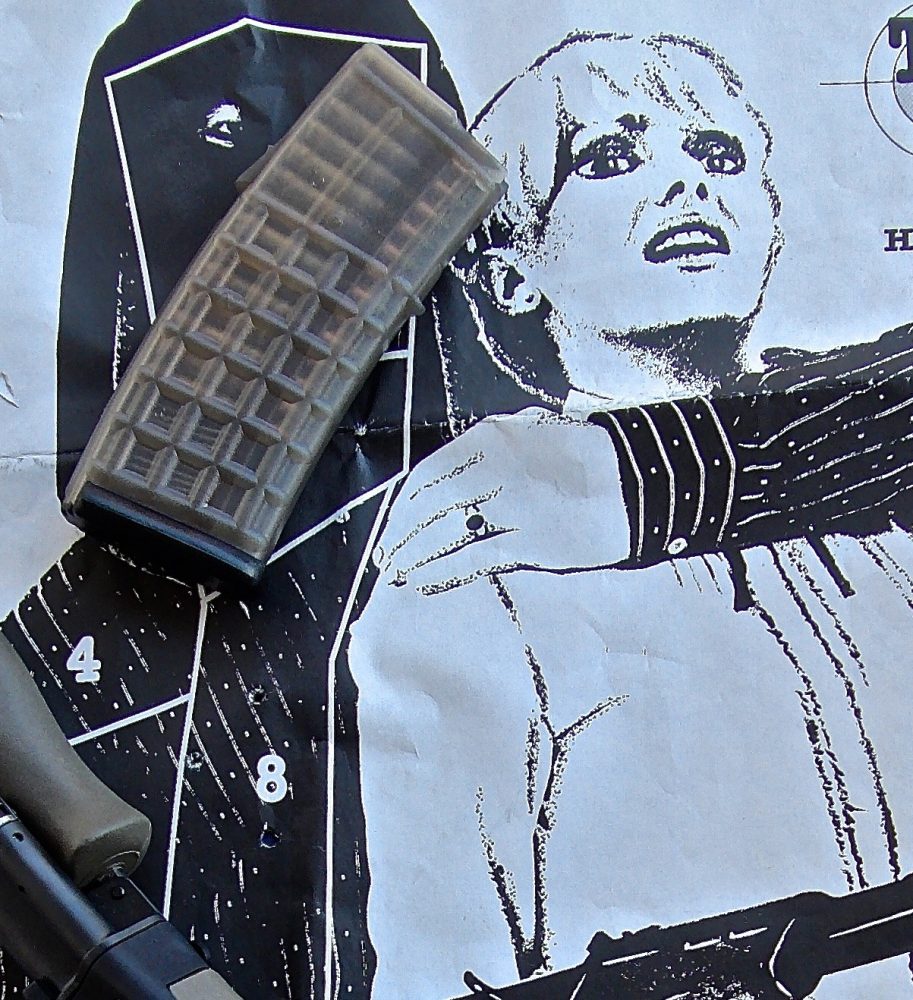
I fired groups at 100 and 200 yards and at plates out to 300 yards. I used M855 for most of my shooting but also used some surplus M193 and Black Hills MK 262 77-grain rounds. Those who have done much shooting with military M193 and M855 probably won’t be surprised that my groups were better with M193 than with M855. My best five-shot group with M193 was 2.62 inches, while with M855 it was 3.25 inches.
Black Hills MK 262 77-grain grouped into 2.87 inches, but the fact that the barrel has a 1:9 twist may have degraded accuracy with the heavier bullet a bit. Firing at the terrorist on a hostage target, I readily kept three shots of M193 in the center of mass or head of the terrorist.
As always when shooting the AUG, the trigger pull was not much of an aid to accurate shooting.
I did most of my shooting with the vertical foregrip folded. I generally use the foregrip extended for quick shooting at closer ranges, but fold it for 100 yards or more. For me, the AUG’s foregrip has always been very comfortable to use. I have fired full-auto AUGs, and the foregrip does help with control when firing bursts.
My A3 M1 came with three 30-round polymer magazines. That’s enough to get started, and spare AUG mags are reasonably inexpensive if you watch for deals. Since I’ve owned AUGs for some years, I’ve accumulated quite a few mags. They are very durable so will probably outlast me. For those who prefer STANAG magazines, the A3 M1 is available with the capability of using M16/AR15 magazines.
I tested the AUG A3 M1 on the assumption that I would like it, since I like the AUG a lot. I was right—I do like it—so much in fact that I will relegate my older AUG to the back of my safe.
The A3 M1 retains all the features of the AUG that I like and has fixed most of the ones I didn’t like. The exception is the trigger pull, which is still heavy and gritty. I can live with that, though, as I’ve shot AUGs enough that I’m used to it.
As always, I appreciate how compact the AUG is. It carries readily in a compact, low-profile case and easily stows in a vehicle. I learned from working with the AUG as a weapon for security details that it deploys quickly within a vehicle or when exiting the vehicle during a counter-ambush drill.
Thirty-five years down the road from when I first handled and fired the AUG, I remain impressed.
SOURCE
STEYR ARMS
(205) 417-8644
www.steyrarms.com
